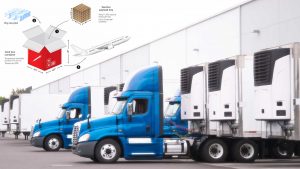Ice-Cold Efficiency: Mastering Refrigerated Logistics
The Vital Importance of Refrigerated Logistics
In the intricate web of global commerce, the efficient transport of perishable goods stands as a cornerstone of modern trade. From farm-fresh produce to life-saving pharmaceuticals, maintaining precise temperature control during transit is paramount to preserving quality and ensuring safety. This is where refrigerated logistics emerges as a crucial player, providing the essential infrastructure needed to keep products chilled and viable throughout their journey from origin to destination. Ice-Cold Efficiency: Mastering Refrigerated Logistics
The Evolution of Refrigerated Logistics
Refrigerated logistics has undergone a significant evolution over the years. Initially reliant on rudimentary cooling methods like ice or insulated containers, the field has witnessed a remarkable transformation propelled by technological innovation.
1. Advanced Temperature Monitoring Systems
One of the most notable advancements in refrigerated logistics is the advent of advanced temperature monitoring systems. Equipped with state-of-the-art sensors and real-time data analytics, these systems offer unparalleled visibility into temperature conditions throughout the supply chain. By continuously monitoring factors such as ambient temperature, humidity levels, and product load, companies can proactively identify and address potential issues, minimizing the risk of spoilage and ensuring product integrity.

2. Next-Generation Refrigeration Units
Another game-changing innovation in refrigerated logistics is the development of next-generation refrigeration units. These units leverage cutting-edge technology to deliver precise temperature control while minimizing energy consumption. Incorporating features such as variable-speed compressors, advanced insulation materials, and optimized airflow design, these units offer superior efficiency and reliability, reducing operational costs and environmental impact.
3. Automated Cold Chain Management Systems
Automation has also revolutionized cold chain management, streamlining processes and enhancing efficiency. Automated systems can seamlessly orchestrate temperature-controlled workflows, from inventory management and route optimization to loading and unloading procedures. By minimizing human error and ensuring adherence to temperature-sensitive protocols, these systems mitigate the risk of temperature excursions and ensure compliance with regulatory requirements.
Challenges and Solutions
Despite the strides made in refrigerated logistics, challenges persist that require innovative solutions. One such challenge is the complexity of managing multi-modal transportation networks, where products may transition between different modes of transport with varying temperature control capabilities. To address this challenge, companies are increasingly adopting integrated logistics platforms that provide end-to-end visibility and control over the entire supply chain, facilitating seamless coordination between stakeholders and minimizing disruptions.
Additionally, maintaining the integrity of the cold chain in remote or underserved regions poses logistical challenges due to limited infrastructure and resources. To overcome this hurdle, companies are exploring alternative energy sources and modular refrigeration solutions that can operate off-grid or in resource-constrained environments, ensuring the continuity of cold chain operations even in challenging conditions.
The Future of Refrigerated Logistics
Looking ahead, the future of refrigerated logistics holds immense promise for further innovation and advancement. Emerging technologies such as artificial intelligence, Internet of Things (IoT), and blockchain are poised to revolutionize cold chain management by enabling predictive analytics, autonomous decision-making, and immutable record-keeping.
Furthermore, the growing emphasis on sustainability and environmental responsibility is driving the development of eco-friendly refrigerants and energy-efficient cooling solutions. By reducing carbon emissions and minimizing the environmental footprint of refrigerated logistics operations, these innovations not only benefit the planet but also contribute to cost savings and operational efficiency.
In conclusion, mastering refrigerated logistics is essential for ensuring the safe and efficient transport of perishable goods in today’s interconnected world. From advanced temperature monitoring systems to automated cold chain management solutions, the industry is continually evolving to meet the evolving needs of global trade. By embracing innovation and collaboration, companies can unlock new levels of efficiency and reliability, setting the stage for a future of ice-cold efficiency in refrigerated logistics.

Recent Comments